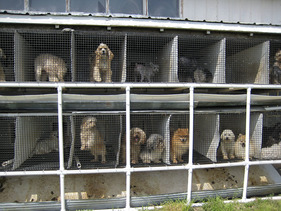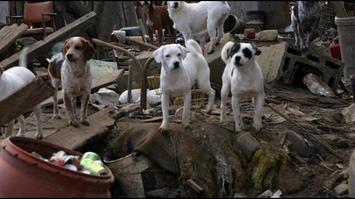Reporting a Puppy Mill

A puppy mill is any dog breeding facility that keeps so many dogs that the needs of the breeding dogs and puppies are not met sufficiently to provide a reasonably decent quality of life for all of the animals. Breeder dogs often spend their entire lives in outdoor cages with no protection from the elements and no opportunity to walk on solid ground. They often receive no veterinary care, resulting in tumors, hernias and cancers. Just because someone is breeding dogs, however, does not mean they are operating a puppy mill and does not mean that they are violating the laws.
If you gain personal knowledge of a breeding operation which you consider to be a puppy mill, follow the same steps that you would follow to report cruelty or neglect. Depending on your location, the person breeding the dogs may also be required to have a city or a county permit. If you live within city or town limits, contact the City Clerk to determine if the person has the proper business license (if one is required). If you live outside city or town limits, contact the County Commission Office (or a comparable county/parish office) to determine if the person is required to pay taxes on the breeding business.
A breeder with less than four breeding females who is selling dogs retail (meaning to private individuals) is not subject to licensing by the United States Department of Agriculture. If the person who is breeding the dogs has four or more breeding females and that person is selling animals on a wholesale basis (to stores, brokers or at auction) that person is required to obtain a license from the United States Department of Agriculture and is subject to certain requirements and inspections. You can contact the USDA to report a suspected mill and to find out if the breeding operation is properly licensed: USDA Animal Regional Care Offices, Your report may be anonymous. If you can't get local help for the situation or if the person is not subject to USDA regulations, you can report the suspected mill to the puppy mill tip line for the Humane Society of the United States by calling 1-877-MILL-TIP.
If you gain personal knowledge of a breeding operation which you consider to be a puppy mill, follow the same steps that you would follow to report cruelty or neglect. Depending on your location, the person breeding the dogs may also be required to have a city or a county permit. If you live within city or town limits, contact the City Clerk to determine if the person has the proper business license (if one is required). If you live outside city or town limits, contact the County Commission Office (or a comparable county/parish office) to determine if the person is required to pay taxes on the breeding business.
A breeder with less than four breeding females who is selling dogs retail (meaning to private individuals) is not subject to licensing by the United States Department of Agriculture. If the person who is breeding the dogs has four or more breeding females and that person is selling animals on a wholesale basis (to stores, brokers or at auction) that person is required to obtain a license from the United States Department of Agriculture and is subject to certain requirements and inspections. You can contact the USDA to report a suspected mill and to find out if the breeding operation is properly licensed: USDA Animal Regional Care Offices, Your report may be anonymous. If you can't get local help for the situation or if the person is not subject to USDA regulations, you can report the suspected mill to the puppy mill tip line for the Humane Society of the United States by calling 1-877-MILL-TIP.
Reporting Dog Fighting
If you gain personal knowledge of a situation that you think amounts to dog fighting, the matter must be handled by law enforcement authorities. Dog fighting is a form of organized crime which is often linked to other types of crimes and you must be very careful to not put yourself in any form of danger. It is unlikely that you will actually witness fighting taking place. It is more likely that you will see indicators of a dog fighting operation: multiple dogs housed in one location or chained outside; dogs with wounds or scars; the presence of a fighting pit and the presence of training materials (treadmills, weights, spring poles or implements used to hang or harness bait animals). You may also witness large groups of people gathering together in a rural area and some of them may be driving vehicles with license plates from other counties or other states.
As with other reports of animal cruelty or abuse, prepare materials to submit in support of your report or complaint, being very careful to not put yourself in danger. The Humane Society of the United States offers a reward of up to $5,000 for information leading to the arrest and conviction of anyone involved in dog fighting or cockfighting. If you have information about dog fighting, you are eligible for this reward. When you contact local law enforcement authorities, tell the agency about the HSUS Animal Fighting Reward Program (Animal Fighting Reward Program, c/o Adam Paranscandola, The Humane Society of the United States, 2100 L Street NW Washington, DC 20037, [email protected]. If you have information about illegal animal fighting in your area, you can also call HSUS’s animal fighting tip line at 877-TIP-HSUS and your information will be kept confidential.
As with other reports of animal cruelty or abuse, prepare materials to submit in support of your report or complaint, being very careful to not put yourself in danger. The Humane Society of the United States offers a reward of up to $5,000 for information leading to the arrest and conviction of anyone involved in dog fighting or cockfighting. If you have information about dog fighting, you are eligible for this reward. When you contact local law enforcement authorities, tell the agency about the HSUS Animal Fighting Reward Program (Animal Fighting Reward Program, c/o Adam Paranscandola, The Humane Society of the United States, 2100 L Street NW Washington, DC 20037, [email protected]. If you have information about illegal animal fighting in your area, you can also call HSUS’s animal fighting tip line at 877-TIP-HSUS and your information will be kept confidential.
Reporting Animal Hoarding or Collecting

Animal hoarding is a form of cruelty or neglect and while many people consider it criminal behavior, it is often the result of some form of mental illness. If you gain persona knowledge of a situation that you consider to be animal hoarding, follow the same steps that you would follow to report cruelty or neglect. If the person who is hoarding animals is someone you know and someone who has family members or friends you know how to reach, consider contacting those individuals to ask if they are aware of the hoarding behavior. We often hear on the news about situations where someone had dozens of animals on their property, many either neglected or dead, and members of the family did not know what was happening. Sometimes the intervention of a family member of friend can help resolve a hoarding situation and can help ensure that the person who was hoarding the animals receives some type of counseling or psychiatric care.